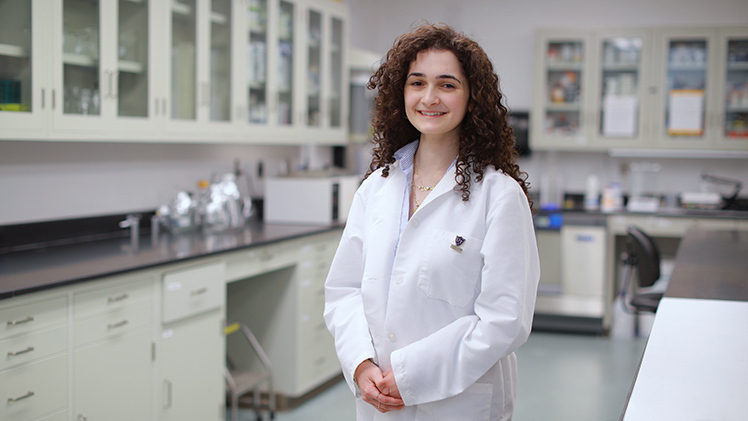Shereen Yassine saw herself in a lab coat.
It was a key reason the aspiring physician decided to enroll at The University of Toledo, where she knew that undergraduates have ample opportunities for laboratory research. She was excited to join their ranks the summer after her freshman year, working alongside doctoral and medical students to explore the health effects of environmental toxins in the laboratory of Dr. Steven Haller and Dr. David Kennedy.

Shereen Yassine, a bioengineering senior, joined the research laboratory of Dr. Steven Haller and Dr. David Kennedy the summer after her freshman year.
“It’s one thing to be able to do research as an undergraduate, but it’s another to have such a supportive environment,” Yassine said. “I was hands-on and involved right away.”
Undergraduate research has opened numerous doors for Yassine, now a bioengineering senior who has co-published research in the peer-reviewed journal Cells and presented her work at UToledo and at national conferences of the Biomedical Engineering Society in 2022 and the Society of Toxicology in 2024.
And there’s more to come.
Yassine said she hopes to continue her research with the lab as a medical student at the College of Medicine and Life Sciences, where she’s been looking forward to being a student since she began at UToledo with an eye on its early medical school pathway BACC2MD.
She recently received her acceptance.
“UToledo has offered so much to me,” Yassine said. “I don’t know why I’d want to go anywhere else.”
Yassine is engaged across campus and the community, having participated in two international trips through the UToledo chapter of Global Medical Brigades and regularly volunteering with the free Halim Clinic in Toledo. She’s also preparing for a study abroad experience this summer, most likely in Lyon, France, to advance the interest in foreign languages that’s motivating her to pursue minors in Arabic and French, as well as chemistry, and a certificate in Intercultural Competency.
She’s come to be particularly invested in the undergraduate research community.
She and other undergraduate researchers are supported by an extensive research ecosystem at UToledo, which logged more than $72.2 million in competitive external awards in fiscal year 2024 and in February was recognized with a prestigious R1 Classification in the latest Carnegie Classification of Institutions of Higher Education.
In working with Haller and Kennedy, each an associate professor of medicine, Yassine contributes to an area of research excellence at the University. Among the environmental toxins the researchers consider is the microcystins released by the cyanobacterial harmful algal blooms that annually affect the western basin of Lake Erie.
Yassine, born and raised in Sylvania, is attuned to the significance of their research.
“We’re doing work that’s impactful on a regional level, but also these are toxins that exist all over the planet,” she said. “Our work also has impacts across the globe, really.”
Yassine connected with the lab through the Office of Undergraduate Research’s First Year Summer Research Experience, which funds students to pursue research and creative projects during the summer following their first year on campus.
She’s found a supportive community there, eager to engage her in hands-on research and offer above-and-beyond support with research proposals and scholarship applications. She’s remained active in the lab, including the year she spent working on the research and development of new implants and surgical instruments for hip replacements and reconstruction surgery at Johnson & Johnson in Warsaw, Indiana, through the integrated cooperative education program at the College of Engineering.
“As biomedical researchers, one of our most important jobs is mentoring the next generation of scientists,” Haller said. “Shereen is intelligent, highly motivated and embodies our philosophy of team-based science. It has been a pleasure working with her and we look forward to watching her career flourish as an aspiring physician-scientist.”